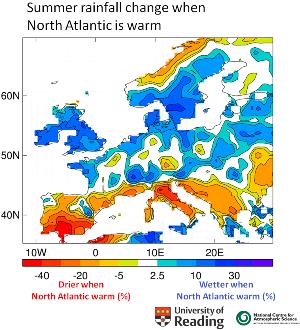Atlantic current decline could be good news for the British summer
Release Date 19 January 2014

Major currents in the North Atlantic Ocean seem to be slowing down, according to new research from the University of Reading.
The findings show that a recently measured slowdown of 10-15% may be part of larger decline that began in the 1990s and shows no sign of stopping yet. This slowdown could have big impacts on weather in Britain and elsewhere.
The Atlantic Meridional Overturning Circulation (AMOC), which brings warm tropical waters up to the latitudes of Britain, linked to the Gulf Stream, is an important contributor to Europe's warm and temperate climate. A stronger circulation has been linked to a higher chance of wet summers in Britain.
Direct measurements of the AMOC have shown a 10-15% slowdown since 20041. This new study links these measurements to other measurements of changes in the deep North Atlantic (below 1km) and computer simulations, which together suggest a larger slowdown, starting in the 1990s and showing no sign of stopping yet.
This weakening of the AMOC is likely to cause a cooling of the North Atlantic Ocean, which has until recently been in a ‘warm' phase. The knock-on consequences could include a reversal of the recent pattern of wet summers in Britain, fewer Atlantic hurricanes, and potentially damaging droughts in the Sahel region of North Africa.Unlike the plot of the science fiction movie ‘The Day After Tomorrow', in which a sudden shutdown of the AMOC leads to dramatic falls in temperature plunging the northern hemisphere into an ice age, the real-world changes are expected to be much less dramatic, and happen over decades, not days.
Dr Jon Robson, from the National Centre for Atmospheric Science (NCAS) at the University of Reading, who led the research, said: "Our findings suggest there could be a relative cooling of the North Atlantic sooner rather than later, perhaps over the next decade or so.
"In Britain we could see a return to drier summers, although it could also lead to more droughts in parts of Europe and Africa. However, there's quite a bit of uncertainty about how fast changes might happen, and other influences - such as sea ice and greenhouse gases - are also important.
"There's lots of evidence that the AMOC is important for European climate, and seeing how these events unfold is a great opportunity to understand this influence better. There's no evidence this slowdown has been caused by global warming, although we can't rule out some link."
Professor Rowan Sutton, research director of NCAS at the University of Reading, was a co-author of the research. He said: "Those of us that spend our summer holidays in Britain would welcome a move away from a recent succession of soggy summers. But this research certainly isn't a forecast for summer 2014, or any other year. However, it could suggest a trend towards drier summers in the UK. These changes in UK climate would occur on top of a longer-term man-made global warming trend.
"The AMOC is linked to the Gulf Stream, which helps to warm British coastal waters, and a weakening of the AMOC could also mean a decline in the Gulf Stream, although there is currently no evidence that this is happening yet."
The research is published in the January edition of the journal Nature Geoscience.
ENDS
For more details contact Pete Castle at the University of Reading press office on 0118 378 7391 or p.castle@reading.ac.uk.
Notes to editors:
Full reference: Jon Robson, Dan Hodson, Ed Hawkins & Rowan Sutton (2014) Atlantic overturning in decline? Nature Geoscience, Vol 7, pp2-3, doi:10.1038/ngeo2050
1Observations of a decline in the AMOC since 2004 were presented in Smeed et al (2013); Ocean Science Discussions, 10, 1619-1645. That study shows a decline in the strength of the AMOC at 26N from measurements taken by the RAPID-MOCHA array, which is a joint UK-US funded deep sea array and led by the RAPID team at the UK's National Oceanographic Centre, Southampton. See www.rapid.ac.uk/rapidmoc
The University of Reading is ranked among the top 1% of universities globally (THE World University Rankings 2014). Its Department of Meteorology is internationally renowned for its excellent teaching and research in atmospheric, oceanic and climate science. The University of Reading is world-renowned for its pioneering research on weather, climate and earth observation and is also home to the Walker Institute for Climate System Research and NCAS-Climate. With 17 scientific authors, Reading was one of the world's biggest institutional contributors to the recent IPCC Fifth Assessment Report.